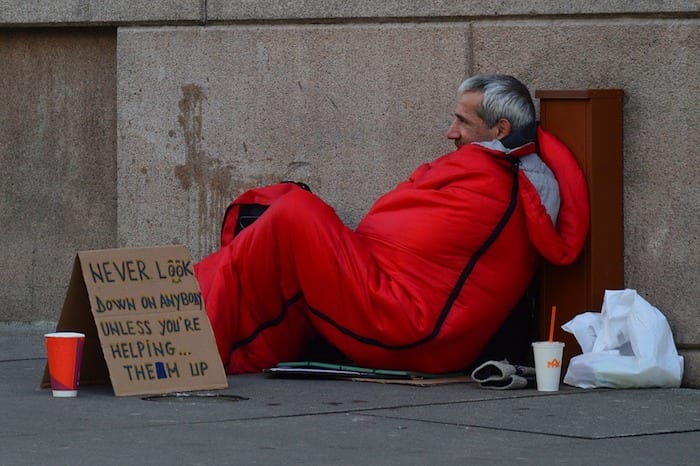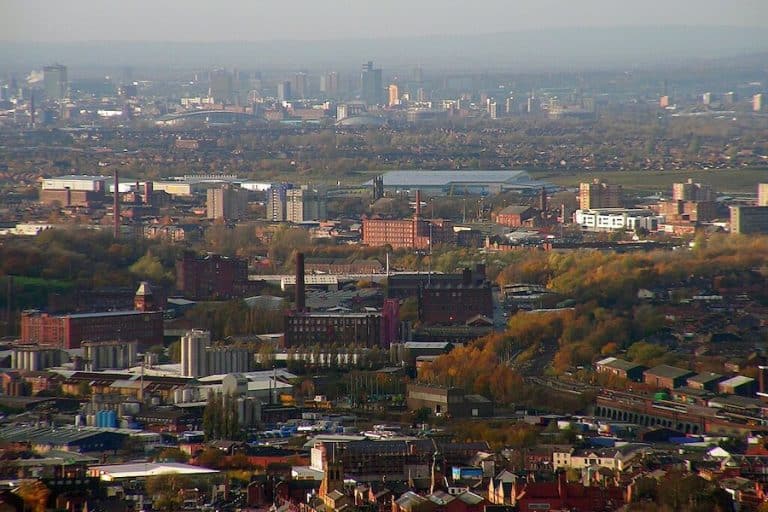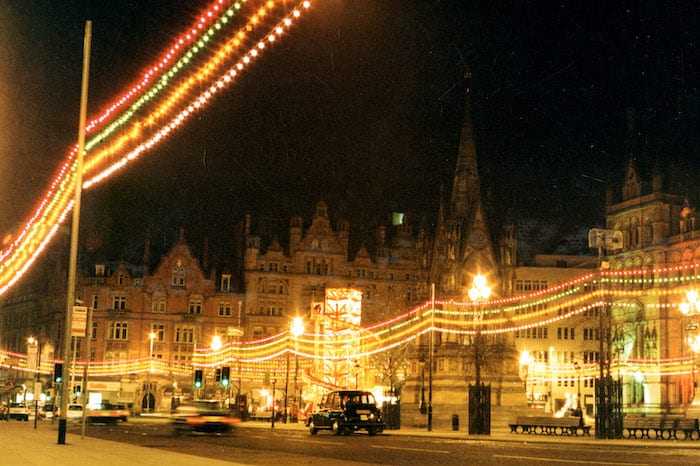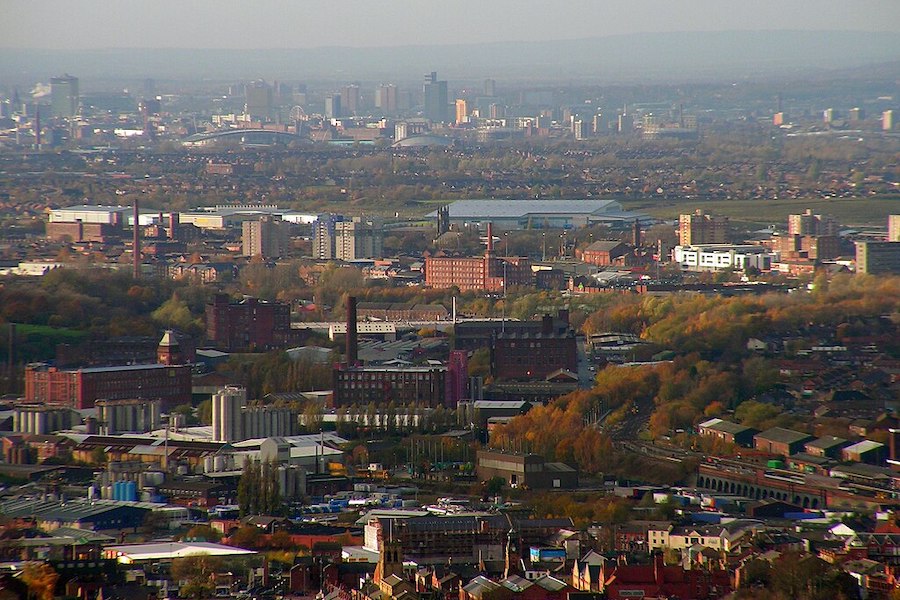Manchester sees ‘remarkable’ drop in people sleeping rough on our streets
- Written by Joseph Timan
- Last updated 2 years ago
- City of Manchester, Civic, Community, People

Since the start of the year, the number of people sleeping on the streets has dropped and fewer families are being housed in B&Bs – with hardly any staying beyond the legal limit now.
It follows a recent spike in homelessness which saw more than 100 families being booked into B&Bs every month with some staying for several weeks.
Last year, one mother who was moved around six hotels and B&Bs with her two young sons told us that her family was living under the same roof as an alcoholic and a registered sex offender with rats ‘everywhere’.

Manchester’s homelessness statistics
Now, the number of people living in all types of temporary accommodation across the city has dropped by 13.1 pc since the end of 2022 when it peaked at 3,194 households. The use of B&Bs has also fallen from 814 in February to 278 with a 79.7 pc reduction in families housed in this type of accommodation.
In fact, Manchester council is now close to meeting its ‘ambitious’ target of having no families in B&Bs for longer than six weeks by the end of June. It comes after the council changed its policies which means more people are getting help before they become homeless and require emergency housing.
Meanwhile, Greater Manchester mayor Andy Burnham expanded his flagship emergency accommodation scheme A Bed Every Night in the Winter as the number of rough sleepers started rising. In Manchester alone, the number of rough sleepers peaked at 61 in September but had decreased to 37 by May.
However, Manchester’s homelessness problem is far from fixed. Last year, the town hall helped more people who were homeless or at risk of becoming homeless than any other local authority in the country after a 54 pc increase in the number of homelessness applications opened over a three-year period.
And that trend is not expected to end any time soon as the cost of living crisis continues and rent is rising across the city. The average rent for a large family home in Manchester currently costs £821 more than the housing benefit covers.
Town hall bosses say increasing the local housing allowance rate – which has been frozen since 2020 – is the single biggest thing the government could do to tackle homelessness. Evictions are the biggest cause of homelessness in Manchester and the government has recently announced plans to prevent landlords from repossessing their properties without fault on the part of the tenant.
Homelessness in Manchester
But charities in Greater Manchester are now calling for a national strategy to end youth homelessness, describing it as an ‘epidemic’. The government says it is giving councils across the city-region more than £20m over the next two years to prevent homeless with more young people now eligible for support.
For its part, Manchester council is pleased that homelessness is falling as the city bucks the national trend. But local leaders promise not to be complacent.
Causes of homelessness in Manchester
Labour’s deputy council leader Joanna Midgley said: “These figures are encouraging evidence that our homelessness transformation programme is beginning to bear fruits and help make a positive difference in people’s lives. They are not, of course, a cause for jubilation.
“We are clear that that the number of people who are homeless is still too high. The challenges of the cost-of-living crisis, the ongoing impacts of austerity, a difficult housing market and other factors driving homelessness are not going away.
“What the numbers do demonstrate, though, is that things are moving in the right direction. The work that we and our partners are doing to tackle this problem head on – whether through increased prevention or a range of measures to move people out of temporary accommodation and into more settled housing more quickly – is having promising results.
“It’s particularly pleasing that we have made such progress in cutting the use of B&B accommodation for families, which we know is always unsuitable and which we have made it a priority to reduce.
“There are also urgent actions we would like to see from the government to address this challenge – for example increasing Local Housing Allowance, which has fallen below average rents across the city, would make a huge difference.”
Government assistance for the homeless
According to national legislation, homeless families can only be housed in bed and breakfast accommodation in exceptional circumstances and for no longer than six weeks. But in February, there were 227 families from Manchester being housed in B&Bs with 131 living there for longer than the law allows.
Not only are these B&Bs unsuitable for families, but they come at a high cost to the council. Earlier this year, town hall bosses revealed that housing a family in a bed and breakfast hotel costs £924 a week on average in Manchester.
Since then, the council has leased an additional 200 properties for temporary accommodation, costing £7.9m over five years, but helping save £34m on B&Bs. The town hall has also changed its social housing allocations policy which now gives people who are at risk of being homeless the same priority on the waiting list as those already experiencing it so people seek support sooner.
People moving out of temporary accommodation and into private rented properties can also keep their place on the waiting list while they wait to be rehoused. And the local authority is helping more people pay rent – which housing benefit rarely covers – to prevent them from becoming homeless.
Council bosses say topping up rent costs less than helping homeless people in crisis. And they say this preventative approach is saving money as despite all the additional investment, the homelessness budget has stayed the same.
But as people are increasingly priced out of private rented properties across the city, local leaders say they need the government to step in and take action. As well as calling for rent caps to be introduced, the town hall is demanding that local housing allowance – which has been frozen since 2020 – increases.
What causes homelessness?
In Manchester, the monthly local housing allowance for a two-bedroom home is £648.22. According to property website Rightmove, just 46 properties across the city that were advertised as available to rent last year were priced below the local housing allowance rate, 38 of which only had one bedroom.
Just two properties with four bedrooms or more were affordable with housing benefit. Shelter’s John Ryan said the homelessness charity sees the impact the housing benefit freeze is having on people in Manchester every day.
He said: “We have families coming to us who have been slapped with a rent increase from their landlord they simply can’t afford. We’re also regularly hearing from people who have been given an eviction notice and are facing the real threat of becoming homeless because they can’t find anywhere they can afford locally as rents are skyrocketing.
“Housing benefit remains stuck at 2020 levels while the demand for private rentals has ballooned due to years of failure to build social homes. This has left private renters desperately trying to plug the gap between housing benefit and the cost of rents in the middle of a cost of living crisis.
“In order to help people pay their rent and keep a roof over their heads the government must immediately unfreeze housing benefit. But the only lasting solution to end homelessness for good is to build genuinely affordable social homes with rents tied to local incomes.”
Homelessness prevention programs
Manchester council published a new housing strategy last year which said that 36,000 new homes must be built across the city within a decade and 10,000 of them should be affordable. The local authority will build council homes and sell land on the cheap to housing associations to build more affordable homes.
The government says rent in the private market has increased below inflation across England at 4.8 pc last year. But in Manchester, rent for the average two-bedroom home has risen by 4 pc in the first three months of this year alone.
Since 2011, the government has provided nearly £1.6bn in discretionary housing payments which help those who face a shortfall in housing costs. It says the Renters Reform Bill introduced last month will deliver a fairer, more secure, and higher quality private rented sector that is fit for the 21st century.
A government spokesperson said: “We recognise the pressures of rising rents which is why we have maintained 2020’s £1bn boost to Local Housing Allowance rates in cash terms – an uplift which provided more than a million claimants with an extra £600 a year on average. We are projected to spend almost £30bn on housing support in 2023-24 on top of a significant package of support to help with rising costs, worth an average of £3,300 per household.
“Evidence shows rent controls in the private sector do not work – leading to declining standards and a lack of investment and potentially encouraging illegal subletting. Our recently announced reforms will deliver a fairer deal for renters, including empowering them to challenge unjustified rent increases.”
- This article was last updated 2 years ago.
- It was first published on 14 June 2023 and is subject to be updated from time to time. Please refresh or return to see the latest version.
Did we miss something? Let us know: [email protected]
Want to be the first to receive all the latest news stories, what’s on and events from the heart of Manchester? Sign up here.
Manchester is a successful city, but many people suffer. I Love Manchester helps raise awareness and funds to help improve the lives and prospects of people across Greater Manchester – and we can’t do it without your help. So please support us with what you can so we can continue to spread the love. Thank you in advance!
An email you’ll love. Subscribe to our newsletter to get the latest news stories delivered direct to your inbox.
Got a story worth sharing?
What’s the story? We are all ears when it comes to positive news and inspiring stories. You can send story ideas to [email protected]
While we can’t guarantee to publish everything, we will always consider any enquiry or idea that promotes:
- Independent new openings
- Human interest
- Not-for-profit organisations
- Community Interest Companies (CiCs) and projects
- Charities and charitable initiatives
- Affordability and offers saving people over 20%
For anything else, don’t hesitate to get in touch with us about advertorials (from £350+VAT) and advertising opportunities: [email protected]

Strictly high-flying: Kelvin Fletcher trades dance moves for dirt jumps at Arenacross

Worker Bee: Meet Peter Hook, legendary New Order and Joy Division bassist

Hilton Manchester Deansgate’s superstar chefs shine on the world stage

How Sounds from the Other City became the UK’s most unforgettable independent festival

Piehard: where to get the best pies in and around Manchester

















